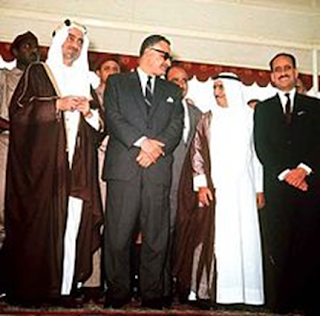The Jamaat-e-Islami: Pakistan's KKK
In the year 1941, Mullah
Maududi founded the Jamaat-e-Islami, a Muslim Brotherhood style organization that Pakistani Human Rights Activist Qasim Rashid identifies as the "KKK of Pakistan." Formed to not only oppose British rule in India, the goal of the Jamaat-e-Islami is to resurrect the "Caliphate" and place the entire world under a Sharia enforced Islamic Empire.
Maududi
stated “Islam wish to destroy all states and governments anywhere on the face
of the earth which are opposed to the ideology and program of Islam regardless
of the country or nation which rules it…Islam requires the earth-not just a
portion, but the whole planet…because the entire mankind should benefit from
the ideology and welfare program [of Islam]…Towards this end, Islam wishes to
press into service all forces that can bring about a revolution and a composite
term for the use of all these forces is “Jihad.” …the objective of the Islamic
“Jihad” is to eliminate the rule of an un-Islamic system and establish in its
stead an Islamic system of state rule.”
The ideology embraced by Maududi is shared with that of Sayyid Qutb, the founder of the Muslim Brotherhood. In truth, the two groups directly mirror each other, both sharing the same goals and aspirations, and both becoming the brain child of more radical Islamic terrorist groups. Whereas counter-terrorism experts state that radical groups like Hamas, Al-Qaeda, and ISIS are direct off-shoots of the Muslim Brotherhood, the Taliban is likewise a direct offshoot of the Jamaat-e-Islami.
Although the Jamaat-e-Islami did not have significant power in the 1940's, they gradually gained influence. In the aftermath of the partition of India and Pakistan, war and instability gripped the nation, leading to widespread Government corruption coupled with ongoing border clashes with India, This led to arise in popularity of the Jamaat-e-Islami, who appealed to the nationalism of the populace and combined with with their Islamic theology to gain power. Their short-term goal was to gain control of the Pakistani government, while their long-term goal is to reunite India and Pakistan under a Sharia State and gradually spread through the surrounding regions.
Their impact was most felt during the Bangladesh War of Independence in 1971. When the nation sought to break off from Pakistan and form their own nation, the religious leaders of the Jamaat-el-Islami declared a "Jihad" against the entire region. They urged the Pakistani military and militia forces to give no quarter and declared that all Bengali women are now "War Booty." As a result, thousands of Bengalis were slaughtered, millions of Bengali Hindu citizens were forcibly expelled to India, and it is estimated that the Paksitani militants rape between 200,000-400,000 Bengali women: Hindu and Muslim alike.
From the 1950's-70's, the power of the Jamaat-e-Islami grew, which led to their infiltration of the Pakistani government. They pushed Prime Minister Zulfikar Bhutto to ban non-Muslims from holding the position of President and Prime Minister. Then then pushed the Pakistani Parliament to officially designate the Ahmadiyya sect of Islam as a non-Islamic faith, despite the fact that the Pakistani Constitution when first drafted forbade the Government to interfere in religious disputes. These laws marked the beginning of the Jamaat-e-Islami's enforcement of their theological doctrine on the Pakistani people, a doctrine that would leave the women and religious minorities of the region in peril.
By the end of the 1970's, General Zia-ul-Haqq, who was backed by that Jamaat-e-Islami-, led an overthrow of Prime Minister Bhutto and seized control of the nation. A radical Islamic fundamentalist, General Zia began to do away with all of Pakistan's secular laws and replaced them with Sharia Laws. Blasphemy Laws were passed throughout the 1980's, making anything perceived as an "insult to Islam" a death sentence. Women's rights were stripped away. Non-Muslims lost their right to vote and their economic opportunities were severely restricted. Leaving Islam for another faith also became a crime. Simply put, by the end of the 1980's, all religious and equal rights were gone.
 |
| Anti-Christian Pogrom in Pakistan |
History shows us peace within a nation cannot exist without religious freedom, and that any nation built on bigotry cannot survive. Unfortunately, the entire Jamaat-el-Islami movement is centered around bigotry and denying religious freedom, and they have obtained a level of power within Pakistan that surpasses any state power that the KKK obtained in the U.S. Many who courageously stand up and denounce the Jamaat-el-Islami & their beliefs pay for it with their lives. Sadly, the Taliban's reconquest of Afghanistan clear shows that the Jamaat-el-Islami shows no signs of growing weaker.
Sources:
Rashid, Qasim. The Wrong Kind of Muslim: An Untold Story of Persecution and Perseverance.” United States: AyHa Publishing, 2013
Husain, Irfan. Fatal
Faultlines: Pakistan, Islam, and the West.
Rockville, MD: Manor Publishers, 2012.
Qasmi, Ali Usman. The Ahmadis and the Politics of Religious Exclusion in Pakistan. London: Anthem Press, 2014.
Yousafzai, Malala and Christina Lamb. I Am Malala. New York: Little, Brown, and Company, 2013.






Comments
Post a Comment